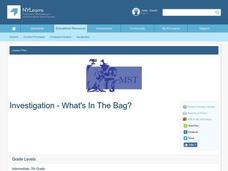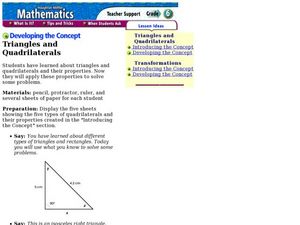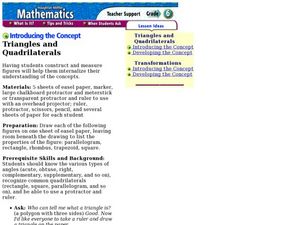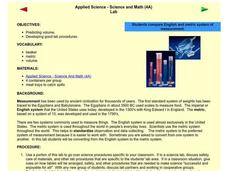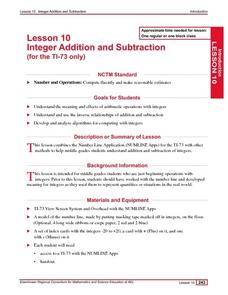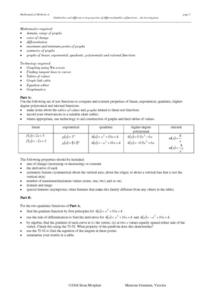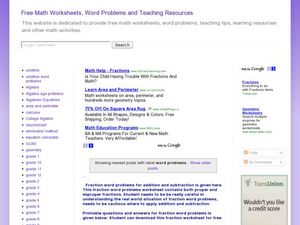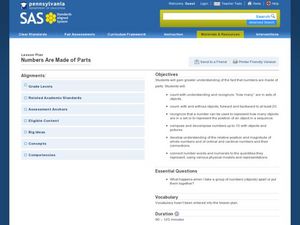Queensland Government
Means, Modes And Medians
Middle schoolers identify the mean, mode, and median of the heights for males and females who are age 13. They describe the difference between the three words and what each signifies. Finally, pupils fill in a table and calculate the...
Power to Learn.com
Survey of Favorites
Upper grade and middle schoolers discuss their favorite TV programs, music, books, etc. Following a lesson on measures of central tendency, learners discuss random sampling. They conduct a survey and use charts and frequency tables to...
Illinois State Board of Education
Is It Linear?
Math apprentices are introduced to the components of a linear relationship. In groups, they write story problems that incorporate this relationship and relates to the real world. They give their problem to the class for them to solve.
NY Learns
Investigation - What's in the Bag?
If you have or can create a set of tiles, numbered one through eight, then you can implement this hands-on lesson about probability models. Individuals draw a tile from a bag, record its number, and then return it to the bag. They...
Curated OER
The Additive Inverse, or the Opposite of a Number
This resource would actually be best used as a projection when teaching about additive inverses. The first "page" shows on a number line how 6 and -6 get you to zero. The second supplies an opportunity for viewers to apply the concept to...
Houghton Mifflin Harcourt
Developing the Concept: Triangles and Quadrilaterals
Exact narrative and examples make this lesson on polygons easy to implement. Through it, your class will learn how to use a protractor and ruler to construct triangles and quadrilaterals according to your directions. Your class will be...
Houghton Mifflin Harcourt
Introducing the Concept: Triangles and Quadrilaterals
Guide your geometers through the process of constructing polygons. They learn how to draw triangles, squares, parallelograms, rectangles, rhombuses, and trapezoids with specified angles using a protractor and a ruler. The lesson plan...
Curated OER
Applied Science - Science and Math Lab
Although it was written to use in a science class, this measurement lesson is adaptable to Common Core standards in math for measurement and data. Youngsters are introduced to two types of measurement systems. They use both the English...
Curated OER
Lesson 2: Measurement Tools
Elementary schoolers examine the uses of rulers, scales, and measuring cups. They determine the criteria for the use of each tool and visit different areas of school to find items that can be measured with these tools. Everyone takes...
Growing Minds
Lettuce Exploration
Kathy Henderson’s book And the Good Brown Earth introduces the class to how a vegetables grows and changes over time. They use different types of lettuce to do a close study of this quick-growing vegetable. Learners consider the look,...
Utah Education Network (UEN)
Pattern Search
Pupils identify and define various mathematical properties, such as the commutative properties of addition and multiplication, and the associative property of addition. They also reason and communicate mathematically by making...
Curated OER
Games for Probability: In-Class and Powerball Simulation
Your soon-to-be statisticians play a game to understand the difference between independent and dependent experiments and probability. They draw colored cubes from a bag and then, by either replacing the cube in the bag, or not, for each...
National Security Agency
Sampling for a Rock Concert
Over the course of three class periods, middle schoolers design an experiment to provide learner input to administration about which rock band to invite to play at school. They practice several random sampling exercises, all well...
Eisenhower Regioanl Consortium for Mathematics and Science Education
Lesson 10: Integer Addition and Subtraction (for the TI-73 only)
Using a number line on the floor made from masking tape and manipulatives, learners observe a demonstration of the addition and subtraction processes. After completing several worksheets, they solve three-term problems using calculators...
Illinois State Board of Education
Geoboard Areas
Middle school geometers determine the area of a shape on a geoboard or dot paper and draw figures that meet given area conditions. Working as a class, they develop and discuss various ways to draw geometric shapes with specified...
Education World
Greater Than or Less Than With "Mr. Great"
Those tricky symbols for greater than and less than have stumped young mathematicians for generations. Mr. Great is a paper plate cut into a Pac-Man shape that can be used to keep track of which direction the symbols should face. This...
Curated OER
Similarities and Differences in Properties of Different Families of Functions - An Investigation
Exploring families of functions allows students compare and contrast properties of functions. Students discuss properties that include symmetry, max and min points, asymptotes, derivatives, etc.
Math Ocean
Fraction Word Problem Worksheets
There are actually several math topics covered by this set of problems. First is the addition of fractions and mixed numbers with both like and unlike denominators. Nine word problems are provided after some whole class practice.There...
Curated OER
Calendar Time
Use circle time to work on counting. Kindergarteners practice the months of the year, say the full date, chart the day's temperature, count to 100, and sing the alphabet song. This kind of daily routine cultivates deep roots for...
Math 4 Children
Counting from 1 to 10
Early math learners count the number of balls in a row and write the number from 1 to 10. Help them connect the quantity of objects to the numeral using visuals to make clear that each number is one more than its predecessor. Provides...
Alabama Learning Exchange
Are You a Square or a Rectangle?
Discover the difference between standard and non-standard units of measure with your class. They differentiate between rectangles and squares, read a book, measure a peer's height. They then discuss measurement methods, make...
Pennsylvania Department of Education
Numbers Are Made of Parts
Children play with barnyard animal cards to practice composing and decomposing numbers. With their "secret number" of animal cards in a cup, they shake and spill them onto a barn story board, counting how many animals fall in the barn...
Curated OER
NUMB3RS Activity: Chains and Pyramids
Watch an episode of the TV show, NUMB3RS and then explore the mathematics of chain letters and pyramid schemes, both of which involve geometric progressions and exponential growth. They discuss why both are dangerous and illegal.
Curated OER
Exploring Transformations with Matrices
A page right out of the Holt Geometry book. Use a graphing calculator and graph paper to explore transformations with matrices.





